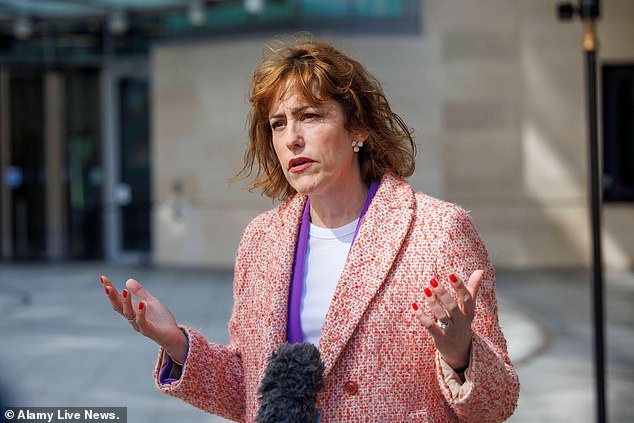How patients are being denied mental health care that could stop them from harming themselves or even committing suicide, by doctors who think they are ‘attention seekers’ and are simply ‘making it up’
Thousands of children and young adults in Britain with serious mental illness are being denied the help they need because doctors label them as difficult and attention-seeking, experts claim.
Leading clinicians are now calling for an immediate ban on classifying young people as having borderline personality disorder (BPD) – a condition where they are often seen as emotionally unstable and even manipulative.
Experts say the diagnosis – although recognized as a medical condition – encourages mental health staff to treat patients as difficult rather than as requiring specialist psychiatric care.
They add that in some cases, doctors ignore warnings that patients with BPD are planning to harm themselves or commit suicide because they think they are “making it up.”
As a result, many are denied treatment with medications or advice that could help. This is despite the fact that research shows that one in ten people with borderline symptoms ultimately commit suicide.
Now hundreds of senior medics have signed a letter to Health Minister Victoria Atkins demanding the term be scrapped. It warns that doctors tell young patients they have flawed personalities, when in reality many have serious mental illness caused by trauma.
Liv Johnson’s diagnosis of borderline personality disorder meant she was denied therapy
The letter, signed by former Health Secretary Sir Norman Lamb and leading psychiatrists, psychotherapists and mental health nurses, said: ‘Until there is conclusive evidence that this diagnosis does not harm children, we say it should not be used in Britain should not occur.’
In England alone, an estimated 8,000 patients a year are treated by the NHS for suspected BPD. Patients find their emotions confusing and difficult to control, they struggle with relationships and experience disturbed thoughts. They often have a deep-seated fear of abandonment and may act impulsively. The diagnosis is made using a nine-point list of symptoms: if patients have five or more, they are labeled as having BPD.
An estimated 1.5 million people in Britain meet the criteria for BPD. But research shows that many mental health professionals treat them differently than those they believe have a ‘real’ problem.
In one study, researchers from the University of Wisconsin interviewed 22 psychiatrists to get their opinions on BPD patients. The results, published in the journal Social Science And Medicine, show that most described them as ‘difficult’ and did their best to get them out of their clinic as quickly as possible.
One of them even told researchers: ‘In professional circles, borderline is often synonymous with ‘a pain in the ass’. ‘
In 2022, the Royal College of Psychiatrists advertised a course for its members describing personality disorders as ‘a thorn in the side of many clinicians’.
“These people are being treated very poorly,” said Keir Harding, an occupational physician and mental health specialist who has campaigned for the abolition of the borderline label for years. “Yet many have experienced neglect, trauma and abuse. Mental health care is failing them.’
Liv Johnson, 25, from Herefordshire, has experience of this. She was abused as a child, which led to an eating disorder in her teenage years. At the age of 15, she was admitted as a psychiatric patient after self-harming and overdosing.
It wasn’t until she received her discharge letter two months later that Liv realized the doctors had labeled her as having BPD. “I don’t remember any review of it or it ever being mentioned by staff,” she told The Mail on Sunday.
In one instance of self-harm, emergency room staff say, staff denied her medical treatment because of her BPD. “They said they didn’t want to stitch my wound because I was a self-harmer who wanted the attention of stitches,” says Liv, who now works as a peer support worker in mental health.
When she was 22, doctors finally changed her diagnosis to Complex Post-Traumatic Stress Disorder to take into account her childhood trauma. It meant she could finally access the therapy she was denied as a borderline patient.

Health Minister Victoria Atkins has been urged to scrap the term borderline personality disorder
Angela Mays, 73, from Hull, lost her 22-year-old daughter Sally to suicide in 2014 after staff at an NHS mental health unit refused to admit her – even though she tried to strangle herself in front of them.
A hearing was later told that one of the nurses said: ‘Leave her down – she’ll pass out before she dies.’
Sally, who had a history of eating disorders and depression, took her own life at home a few hours later.
Retired management consultant Angela insists her daughter was not taken seriously because she was diagnosed with BPD.
‘It is a stigmatizing term. Most doctors consider it a behavioral disorder. An NHS psychotherapist told me that my daughter wasn’t really ill at all, even though she had been in and out of hospital for three years.’
Dr. Lade Smith, president of the Royal College of Psychiatrists, said: ‘Caring for children with mental health needs is of paramount importance – we work with experts to ensure they receive the best possible high-quality mental health care.’
The Department of Health and Social Care was contacted for comment.
